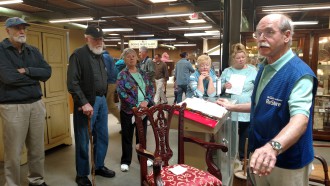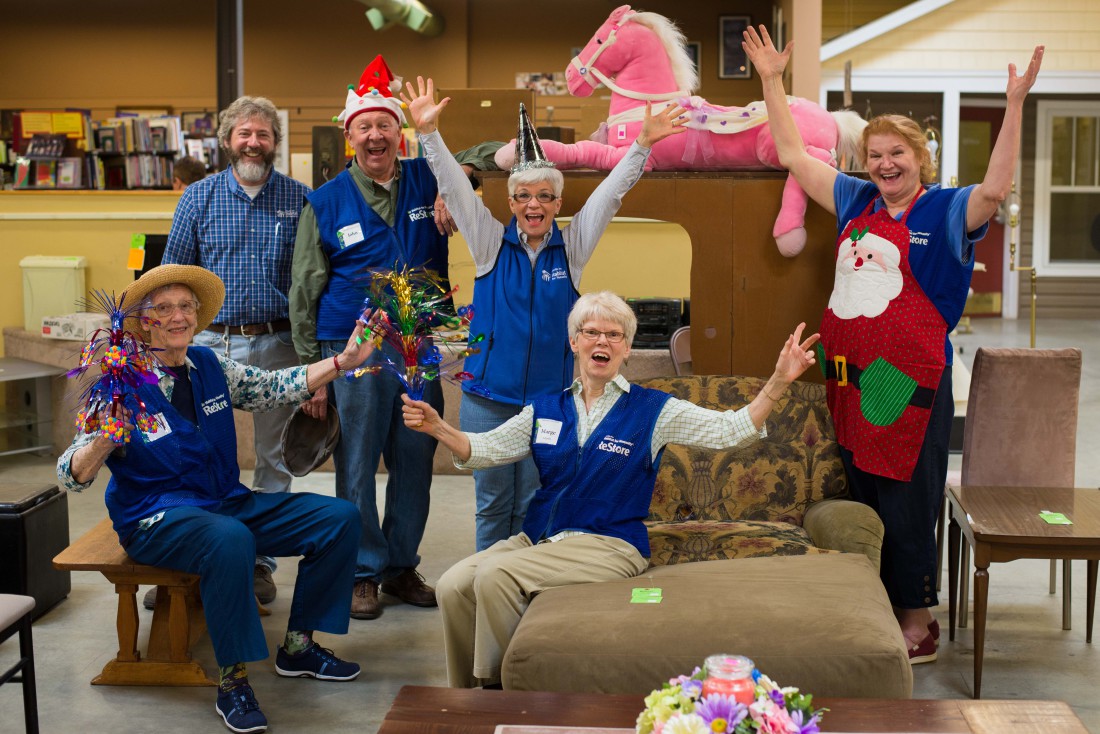Books, toilets, rugs, records, glassware, furniture, building supplies. On first glance, the eclectic inventory at Asheville’s Habitat for Humanity ReStore might seem haphazard, but the organization itself is a well-oiled machine.
Habitat for Humanity International recently ranked the Asheville ReStore second in gross sales among the parent nonprofit’s nearly 800 such retail shops, presenting a lifetime achievement award to recently retired general manager Jay Sloan, who oversaw the retail operation for more than a decade. Habitat’s corporate headquarters, which mentors stores in other cities, has even begun looking to Asheville for answers.
“We often recommend that new store managers visit the Asheville Area Habitat ReStore for best practices and ideas,” says Frank Reed, senior director of ReStore support at the international nonprofit, which uses volunteers to build or renovate housing for families in need. The store, continues Reed, is “a great place to shop, volunteer and donate.”
So, how does this small-town store outperform hundreds of peers across the nation?
The ever-expanding showroom
In 1990, under the leadership of Executive Director Lew Kraus, the Habitat Home Store opened on Biltmore Avenue, making the Asheville Area Habitat affiliate one of the first in the nation to partially fund its housing projects through a retail operation. Some years later, the small shop expanded dramatically: In 2001, Asheville residents Skip and Mary Pearlman donated the ReStore’s current facility, the much larger 31 Meadow Road location.
In 2010, seven years after relocating to the newly renovated building, Sloan oversaw a complete revamping of the space during the Building a Way Home campaign, an initiative to triple the number of families served by the local affiliate. Sloan’s team turned covered parking spaces into an expansive showroom, added a customer-friendly loading dock and rearranged the upper sales floor to include a books-and-records section, among other upgrades.
Boasting 27,000 square feet of retail space, the ReStore has an additional 21,000 square feet that holds a steady stream of inventory. Endless bins of electronics, stacks of paintings, clusters of appliances and other donations fill this hidden lair, waiting to be processed.
“It takes a lot of room to get this merchandise ready,” notes Sloan. And for an operation that processes massive donations — 100 couches at a time is no big deal — that extra space is a definite asset. Sometimes, the Asheville outlet temporarily holds donations made to other, smaller ReStores until they can arrange transportation and storage.
It takes a village
Habitat has garnered considerable support from Western North Carolinians over the years.
Some shop at the ReStore because they know the profits support Habitat’s building programs (ReStore sales account for 12 percent of the Asheville Area Habitat’s total revenue). But others simply want to get their gardening pots for 50 cents and raid the dollar record bin on the way out. Asheville’s many “do-it-yourselfers and fixer-uppers” provide a dependable flow of customers, says Sloan.
“We have a lot of customers that come in on a daily or weekly basis, because the nature of thrift shops is hit-or-miss — the more you come, the more likely you are to find what you’re looking for,” says Ariane Kjellquist, communications director for the local affiliate. “We don’t want our merchandise to sit there, so it’s priced to move quickly.”
To encourage even more loyalty and keep inventory moving, the ReStore gives holders of the Go Local Card a 10 percent discount on all purchases.
Local hotels, which need to replace furniture regularly, have come to know the ReStore as a deserving beneficiary; other businesses also offer bulk donations when they have surplus goods. In 2014 alone, Biltmore, Deerfield, Givens Estates, Hampton Inn & Suites, Mission Health and NOVA Kitchen & Bath each gave the ReStore at least $5,000 worth of merchandise.
“The majority of the leading hotels in Asheville donate to the Habitat ReStore, or they have at one time,” Sloan reports. Individuals can easily bring unwanted items to the drop-off door as well.
Shoppers and donors, though, aren’t the only ones beating down the ReStore’s doors.
The greatest donation of all
“Volunteers are the lifeblood of Habitat,” says Sloan. Last year, the ReStore’s 444 unpaid workers collectively racked up 25,818 hours on the clock — a record-breaking figure for the operation. Supplementing this force are two dozen full- or part-time employees, who often mentor new teammates.
“Asheville is an attractive place for retirees to move to, and many of these people want to be active and involved in their community,” he explains. “A lot of them end up at Habitat.”
This highly skilled army, notes Sloan, includes “volunteers with all different types of backgrounds, from CEOs to construction workers to electricians and desk jockeys of all descriptions,” and the ReStore’s eclectic spectrum of merchandise affords “a niche for just about any interest.”
Volunteers get to choose their own role and can switch departments if they’re unhappy. In addition, ReStore hosts an annual appreciation event for these valued workers. Imparting each hour with meaning, says Sloan, encourages volunteer longevity.
“There’s a reason we’re scanning books at the bookstore,” he explains. “The only purpose of the Habitat ReStore is to provide funds for the building program — that’s why it was started. So I think it’s a means to an end.” Volunteers are encouraged to visit the nonprofit’s building sites to better understand the impact of Habitat-built houses.

And the highest bidder is…
Several creative initiatives at the Asheville store — like the ReUse contest, which showcases participants’ creative upcycling projects — have piqued the interest of other ReStore managers. One program, though, particularly exemplifies volunteers’ capacity to make a difference.
“I’m an antiques freak,” says retired teacher Alan Williams, a 14-year ReStore veteran who founded its silent auction. Williams’ fascination with the TV program “Antiques Roadshow” inspired him to find a better way to monetize esoteric donations. And on May 18, the silent auction will celebrate 10 years and more than $660,000 in total revenue.
“Everybody wins,” says Williams. “Even if people pay more than they should, they know it’s for a good cause, but most of our items go for less than market value.”
Auction participants, who typically have 60 to 75 weekly items to peruse, have taken home some truly unique treasures over the years.
“We once had a headrest from Africa,” Williams recalls. “It was a wooden-framed item that women used to put their heads on so they didn’t mess up their hair, and to keep their heads from touching the ground.” A discerning bidder had to identify the object, as nobody at the store could.
“We looked on the ‘Antiques Roadshow’ back programs, and it sold there for $2,500. Needless to say, we did not get that much. I think we got $100, so somebody either has a good souvenir or they had a good investment,” he reflects.
Another time, the ReStore wound up with a carpet from a building adjacent to Checkpoint Charlie, a famous crossing point between East and West Berlin before the Berlin Wall came down, according to the donor.
“Somebody now has that in their home,” says Williams, and “can say, ‘Oh! I have a carpet that President Reagan walked across!’” The final bid, he recalls, “was quite a nice sum: over $1,500.”
Williams says old tools and cookie jars also have impressive track records, along with old model trains. “Some of the people that get the trains aren’t little kids: They’re grown men,” he says with a smile. “So grown men still are little boys sometimes.”
These days, the auctions, which begin at noon on Friday and end the following Wednesday at 2 p.m., are raising a few thousand dollars each week. “It’s fun so far,” Williams says about his lengthy tenure. “When it’s not fun anymore, I’ll go find something else to do.”
Improving on excellence
“Habitat is always looking for something different to draw people in and be of service to people,” notes Williams, and current ReStore General Manager Scott Stetson says he’s up for the challenge.
“I have done a few things to try to keep improving on our ReStore here in Asheville,” says Stetson. “We just recently finished remodeling our building supply showroom, making it a better shopping experience: safer, brighter, better organized. We now carry brand-new porcelain floor tile, high-quality laminate flooring and area rugs — all for just a fraction of what you might find at other retailers.”
And Kraus, the affiliate’s longtime executive director, continues to guide the ReStore team, says Stetson. “He leads our vision here in Asheville and makes it possible for us to do this. We can’t be settled in, saying, ‘This is done, and this is what we’re going to have.’ It’s a constantly changing thing, and the success is all to be able to serve more families. That’s why we’re doing it; that’s the bottom line.”




Great article, Kat! Thanks.
Glad you enjoyed it! Thanks!
Hello,
I would like to use your picture for a Habitat ReStore Promotional Flyer for the Habitat for Humanity of Hall County affiliate. Please email me regarding this matter.
Thanks!
You can request permission from publisher@mountainx.com.